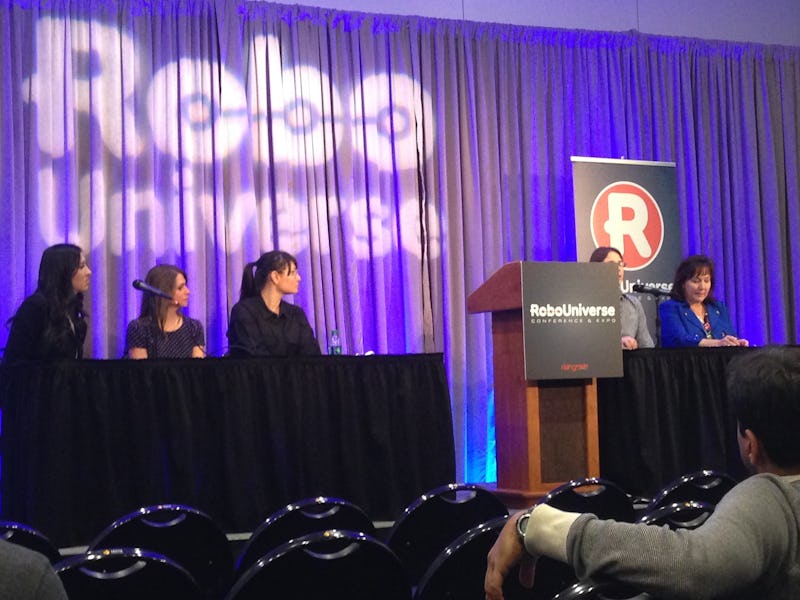Melonee Wise Says More Women Should Know "Engineering Is a Creative Field"
The CEO of Fetch Robotics joins a panel of other women and talks about the need for a more diverse STEM industry.

“Pink Legos, blue Legos; I think that’s ridiculous.”
Melonee Wise isn’t shy about wanting to tear down gender stereotypes to get more women involved with robotics and engineering. The CEO of Fetch Robotics has been working with robots for 15 years, and in that team, she hasn’t seen much progress being made in easing up the gender disparity.
During a keynote panel at the RoboUniverse 2016 conference in Manhattan on Monday, Wise, along with Moondial founder Sabine Seymour and ABC News journalist Maria Stefanopoulos, described from the stage at the Javits Center their experiences in the world of the robotics industry, which in the last decade has taken big leaps forward, in both technical prowess and practical application. All three have witnessed and participated first-hand in this progress.
Unfortunately, they are just a small group of women working in what is still a boys club.
“If you look at engineering in general, there’s only like five-to-10 percent of women in engineering,” Wise tells Inverse. “Then you take the subset of robotics in engineering and then maybe only five-to-10 percent of those are women. The number of women in the field is pretty small. I don’t know if it’s growing — it doesn’t feel like it’s changing.”
Fetch in action.
Wise says her experience limits her perception to just a small subsection of robotics. Her Fetch Robotics focuses on making robots work for logistics and manufacturing needs. That comprises data survey tasks (like tracking physical assets, measuring temperature and humidity in certain rooms), point-to-point transit (when robots are responsible for transferring objects), and following humans along during their tasks to provide assistance of some sort, like transportation.
“We brought our robots to one facility to do a pilot,” says Wise. “Within a first couple of hours the people were like, ‘Oh my gosh I love your robot. I’m so glad I’m not walking!’ It was unbelievable. They called them pups, and the robots were their best friends within four hours.”
Nevertheless, if RoboUniverse 2016 is any indication, there’s a dearth of women across the robotics world. By my estimate, women made up only about 10 to 15 percent of the total attendees.
Melonee Wise, with the Fetch robot.
“The biggest challenge is getting women to apply,” says Wise. “We’ve tried a million different tactics on that one. There’s just not that many women. For every hundred applicants, maybe four or five apply.”
For a long time, facial recognition algorithms only really knew how to identify white male faces
A lot of that has to do with the fact that despite efforts by many institutions and organizations across the nation, girls are still not as likely to pursue STEM as their male counterparts. Part of the problem, Wise thinks, is that STEM fields don’t advocate as well for diversity as other academic fields do — even though it’s critical to doing good science and tech research. An example she used was how for a long time, facial recognition algorithms only really knew how to identify white male faces. This was because those programmers were using themselves as test subjects — and they happened to be pretty much white men.
In addition, she told the audience at the panel that she thinks “we create big walls for people early on,” by telling them that have to be smart to do these things, “when actually, we should be telling them need to be creative to do these things.”
“Engineering is a creative field, and that’s the only way you get innovation.”
Seymour is proof of this creativity in action. Her work with Moondial is all about integrating sensors into flexible textiles — i.e. creating smart clothing. This encompasses pretty much all the kinds of data that affects your body: temperature, hydration, the way one speaks, occupational activities, and much more.
Seymour, a professor of Fashionable Technology at the Parsons School of Design at the New School, calls it “artificial intelligence with style.”
She agrees with Wise’s thrashing of the rigid ways many people believe men and women inherently think. “Those stereotypes just don’t work for me, and I don’t think they will work in the future,” she told the audience. “We need to be much more hybrid.”